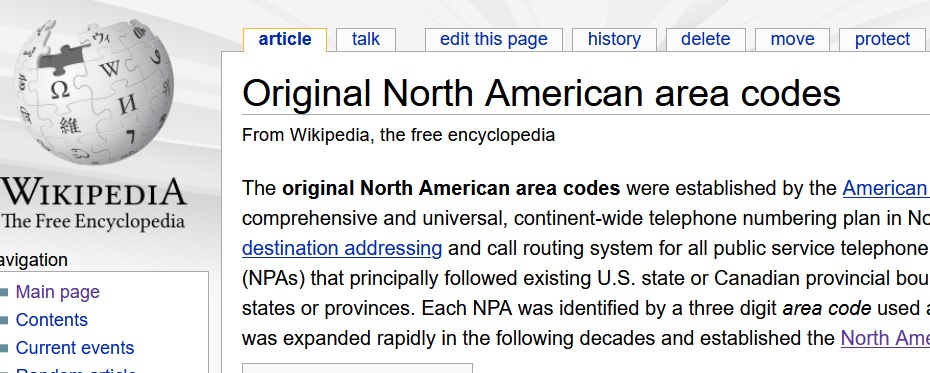If there’s one thing that people hate, it’s admitting they’re wrong.
Since I’m a people I hate it, too, but when you’ve been repeatedly wrong in print it’s hard to pretend you weren’t bone-headed. So here goes:
My favorite piece of information about area codes, something that I have gleefully repeated many times over a dozen years, including as recently as two weeks ago during the rollout of mandatory 603, isn’t actually true. Before I give details of this shameful tale, let me mention two other items related to area codes.
First, although it was generally reported that dialing 603 is now required for all in-state calls, note that not all switches on the landline network have been upgraded so ten-digit dialing is not always necessary, as I noted in my last story on the topic. This morning, in fact, I’ve had two calls go through just fine despite not dialing the area code. You can’t count on this, however; I’ve also run into a few “cannot connect” automated answers.
The absolute deadline for the transition is next June, when the new national suicide hotline begins.
Second, an update.
As you may recall, a decade ago we thought we would soon run out of phone numbers under 603, forcing New Hampshire to adopt a second area code. That possibility produced much wailing and gnashing of teeth throughout the Granite State until the Federal Communications Commission said better distribution of unused numbers meant 603 would last through the early 2030’s.
Good, but could be better. There are 7.7 million allowable numbers under 603 but a year ago only 3.4 million have been distributed because under the current system, many potential numbers can’t be accessed.
So last year New Hampshire supported Maine’s petition to the FCC asking to test an even more efficient way of doling out phone numbers called individual telephone number pooling, which would make 603 last much longer. I got curious about where that petition has gone but as of last week, I’m told, no action has been taken on it. Stay tuned, as they say.Support the Concord Monitor. Subscribe Today
Enough updates; it’s time for my self-abasement.
My erroneous story involves the creation of the country’s original 86 area codes in 1947. At some point I heard, and accepted without confirmation (>italic<booo>res<!), that they were distributed by population with the biggest places getting numbers that had the fewest “clicks” on a rotary dial, formally known as pulses. The idea was to minimize the total amount of time that dialing area codes would take up on the national switched network.
So New York city got 212 (total of 5 clicks), Lost Angeles got 213 and Chicago 312 (six clicks), and so on. The three single-area-code Northern New England states showed this pattern perfectly: Maine and New Hampshire were almost the same population and had the same number of clicks (603 is 19 clicks, since 0 takes 10 of them, and so is Maine’s 207) but smaller Vermont got more clicks (802, or 20 clicks).
Great story, isn’t it? Until you look at those original 1947 area codes, which I had never done until a couple weeks ago.
On the original list you will find, for example, that the two Carolinas both had far more people than New Hampshire but also were given more clicks: 21 of them (803 and 704). Closer to home, well-populated Boston got 617 (14 clicks) while the empty-ish western part of Massachusetts got 413 (just 8!).
Indeed, a wikipedia article goes out of its way to scold me, saying that although it had been repeated by “numerous media outlets and blog-style online publications” (ouch), a population-related count was never part of the design. “The concept appears to agree only for a few of the largest of cities, which were already designated Regional Centers for switching in the plan of 1929,” it says.
So there you have it. I was wrong repeatedly because I committed an egregious journalistic sin, repeating a story that was too good to check.
At this point I could get serious and draw parallels with how too many people cling to disproved ideas because they hate to admit their error, but we face enough serious news these days so I think I’ll just leave it at that.


 Return to the Concord Monitor
Return to the Concord Monitor